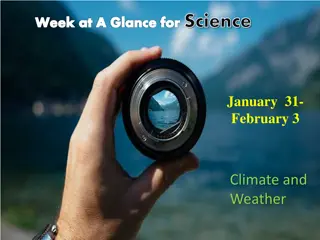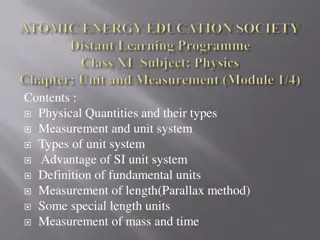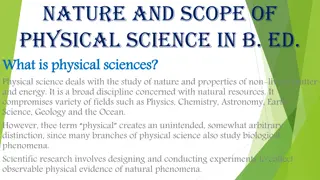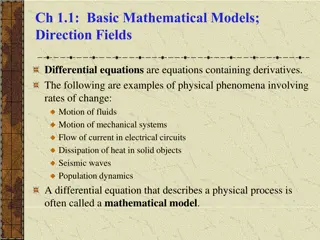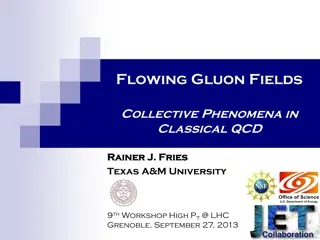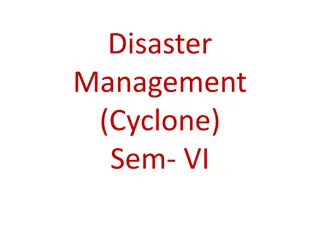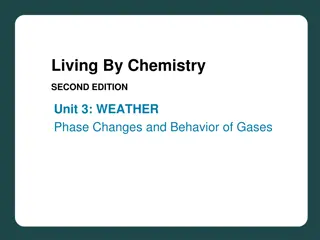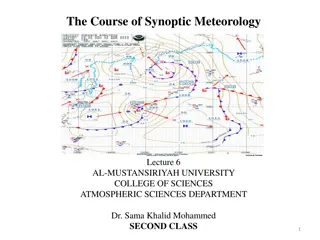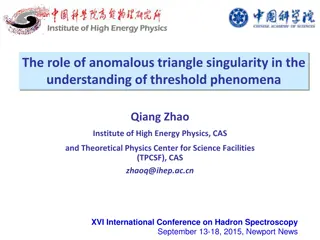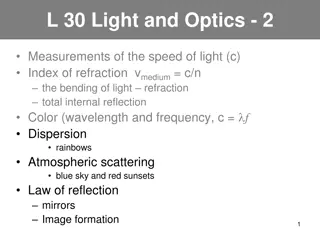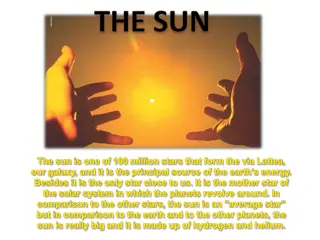Physical Distribution
Physical distribution is a critical aspect of business operations involving the planning, implementation, and control of the flow of goods from origin to consumer. Philip Kotler and William J. Stanton have defined physical distribution as a process of managing the movement of goods to meet consumer
0 views • 8 slides
Exploring the Meaning and Definitions of Physical Education
Physical education involves systematic training and instruction related to physical activities for the development and maintenance of the human body. It encompasses the growth of physical power, the cultivation of physical skills, and overall enhancement of physical well-being. Various definitions h
7 views • 7 slides
Importance of Fitness Testing in Physical Education
Health-related physical activity (HRPA) stresses the need to view fitness testing as a tool to promote increased physical activity levels rather than an end goal. The focus in school physical education is on equipping youth with the knowledge and skills for lifelong health. Fitness test protocols sh
0 views • 17 slides
Science Week at a Glance: Climate and Weather Insights
Dive into a week of science exploration focusing on climate and weather phenomena. From analyzing atmospheric layers to understanding the impacts of moisture on weather patterns, this overview covers a range of topics including greenhouse gases, hurricanes, wind systems, and meteorological events. E
3 views • 6 slides
Space Weather: The Sun-Earth Connection
Explore the intricate relationship between the Sun and Earth, as space weather phenomena such as solar flares and sunspots impact our daily lives. Discover how disruptions in communication systems, satellite navigation, and power grids can occur due to solar activity, highlighting the importance of
5 views • 37 slides
Unveiling the Mysteries of the Æther: A Metaphysical Perspective
A philosophical framework, the Æther seeks to provide a foundational understanding for interpreting "electromagnetic" phenomena. Postulated as an energetic, metaphysical background, it is considered a medium or substrate facilitating these phenomena. This proposed concept delves into the realm of p
0 views • 53 slides
Understanding Pharmaceutical Degradation: Types and Factors
Pharmaceutical degradation refers to the process of a formulation in a specific container losing its chemical, microbiological, therapeutic, physical, and toxicological specifications. It can be categorized into physical, chemical, and microbiological degradation. Physical degradation alters the dru
1 views • 50 slides
Understanding Physical Quantities and Measurement Systems
Physical quantities can be fundamental or derived, and they play a crucial role in describing physical phenomena. Measurement involves comparing quantities with standard units, with fundamental units for base quantities like length, time, and mass. Different unit systems exist, including CGS, FPS, M
3 views • 13 slides
Significance of Models in Agricultural Geography
Models play a crucial role in various disciplines, including agricultural geography, by offering a simplified and hypothetical representation of complex phenomena. When used correctly, models help in understanding reality and empirical investigations, but misuse can lead to dangerous outcomes. Longm
0 views • 8 slides
Electric Properties of Colloids in Liquid Media: Charging Mechanisms and Electrokinetic Phenomena
Colloidal particles dispersed in liquid media can acquire a charge through selective adsorption of ionic species or ionization of surface groups. This leads to electrokinetic phenomena like electrophoresis, electro-osmosis, sedimentation potential, and streaming potential. The stability of colloids
1 views • 16 slides
Understanding Ocean Currents: El Niño and La Niña Phenomena
Explore the impacts of El Niño and La Niña phenomena on weather patterns, from unusual warming (El Niño) to cooling (La Niña) of the Pacific Ocean. Discover how these phenomena affect regions like North America, Southern California, and North Carolina, influencing temperature, precipitation, and
0 views • 9 slides
Understanding Interfacial Phenomena in Surfactant Solutions
Micelle formation is a key process in surfactant solutions, where the critical micelle concentration (CMC) is reached leading to the formation of micelles. The CMC decreases with longer hydrophobic chains and is influenced by the addition of electrolytes. Adsorption at solid interfaces and wetting p
1 views • 21 slides
Understanding Physical Science in B.Ed: Nature, Scope, and Careers
Physical science in B.Ed involves the study of non-living matter and energy, covering fields like Physics, Chemistry, Astronomy, Earth Science, Geology, and more. It emphasizes experimentation to gather evidence of natural phenomena, with a broad scope spanning visible and invisible realms. Graduate
0 views • 8 slides
Understanding Differential Equations in Physical Phenomena
Differential equations play a crucial role in modeling physical phenomena involving rates of change like fluid motion, mechanical systems, and heat dissipation. This content explores examples of differential equations in motion and provides insights on sketching direction fields using tools like Map
0 views • 11 slides
Research Work for Physical Activity Statistics in the Czech Republic
The Czech Republic excels in measures of well-being but faces challenges in income and wealth distribution. Research in physical activity statistics focuses on various aspects like strength, speed, mobility, and mental well-being. Initiatives include assessing energy expenditure from basic activitie
1 views • 23 slides
Understanding Flowing Gluon Fields and Color Glass Phenomena in QCD
Explore the collective phenomena of gluon fields in classical QCD, focusing on the Standard Model of URHICs, Color Glass, and Gluon Fields in the Forward Lightcone. The research delves into topics like local thermal equilibrium, viscous hydrodynamics, and the interaction of probes with quarks and gl
0 views • 24 slides
Understanding Cyclones and Associated Phenomena in Disaster Management
Cyclones are large air masses characterized by swirling winds around a low-pressure center. Mesocyclones are vortexes within storms that can produce tornadoes. Dust devils and waterspouts are related phenomena, with dust devils ranging in size and potential threat levels. Other variations include st
7 views • 8 slides
Understanding Human Sciences: Chapter 2 Insights
In Chapter 2 of Integrating the Human Sciences, key definitions such as phenomena, subsystems, and causal links are explored. The study emphasizes developing a map of human science to understand the intricate relationships between various phenomena. It delves into economic growth as a phenomenon and
0 views • 14 slides
Exploring Weather Phenomena and Meteorological Predictions
Dive into the fascinating world of weather phenomena and the science behind meteorological predictions in this unit of Living By Chemistry SECOND EDITION. Learn about proportional relationships, temperature scales, behavior of gases, and how to interpret weather maps to make accurate predictions. En
0 views • 19 slides
Understanding Interfacial Phenomena and Micelle Formation
Interfacial phenomena play a crucial role in the formation of micelles in surfactant solutions, leading to a decrease in surface tension. The critical micelle concentration (CMC) marks the point where micelles first form in the solution. Factors like chain length and electrolytes impact CMC and mice
0 views • 20 slides
Exploring Quarkyonic Matter and Chiral Pairing Phenomena
Investigate the characteristics of quarkyonic matter and chiral pairing phenomena in the context of dense QCD at T=0. Delve into the confinement aspects, the properties of quarkyonic matter near T=0, and the candidates for chiral symmetry breaking. Consider the implications of chiral pairing phenome
0 views • 42 slides
Fundamentals of Physical Measurements
Science and engineering rely on measurements to understand natural phenomena. Physics aims to predict future outcomes based on observed data and fundamental laws. Base physical quantities like length, time, and mass have standard units, forming the foundation for deriving other physical quantities.
0 views • 13 slides
Understanding Physical Fitness and its Components
Physical fitness encompasses health-related and skill-related components that contribute to overall well-being. Health-related fitness includes muscular strength, endurance, cardiorespiratory endurance, flexibility, and body composition. On the other hand, skill-related fitness comprises speed, agil
0 views • 22 slides
Reimagining Physical Education: A Holistic Approach at St. Peter's Girls Prep School
In the context of St. Peter's Girls Prep School, the philosophy around physical education is explored, emphasizing the integral role it plays in a child's holistic development beyond just playing sports. The approach focuses on instilling healthy habits, balanced nutrition, and physical fitness alon
0 views • 18 slides
Understanding Synoptic Meteorology: Fronts and Weather Phenomena
Fronts are boundary surfaces that separate air masses of different densities, leading to various meteorological phenomena. Cold fronts, warm fronts, occluded fronts, and stationary fronts impact weather patterns differently, affecting temperature, moisture levels, and wind direction. Understanding t
0 views • 22 slides
Understanding Medical Records: History, Physical Examination, and Abbreviations
Medical records play a crucial role in documenting a patient's medical history and findings from physical examinations. The history and physical (H&P) document includes subjective information from the patient and objective observations by the examiner. The history (Hx) record covers personal medical
0 views • 20 slides
Role of Anomalous Triangle Singularity in Threshold Phenomena Understanding
Anomalous Triangle Singularity (ATS) is explored in the context of threshold phenomena understanding, focusing on its occurrence when all three internal particles are simultaneously on shell. The study delves into kinematic effects, genuine states recognition, and specific cases such as heavy pentaq
0 views • 36 slides
Understanding Phenomena-based Research in Information Management
Explore the evolution of modern science, the importance of phenomena-based research in connecting theory to reality, and the consequences of unreal research in the realm of technology acceptance models. Delve into the significance of relating research to the real world for meaningful impact and prog
0 views • 20 slides
Exploring Light and Optics: Reflection, Refraction, and Phenomena
Explore the fascinating world of light and optics, delving into topics like the speed of light, index of refraction, reflection, refraction, dispersion, rainbows, atmospheric scattering, and more. Understand how different colors of light are refracted, leading to phenomena such as rainbows and blue
0 views • 23 slides
Steps to Success: Conducting Scientific Experiments
Scientific experiments play a crucial role in discovering new things. Follow a specific order of steps outlined in the guide to successfully conduct experiments. Begin by understanding biological phenomena, formulating hypotheses, planning, performing experiments, observing results, and drawing conc
0 views • 29 slides
Understanding Surface Chemistry and Adsorption Phenomena
Surface chemistry is a crucial branch of chemistry that focuses on the chemical processes occurring at interfaces between different surfaces like solid-liquid, solid-gas, and liquid-gas. This field plays a significant role in various industries, including electronics. Adsorption, absorption, and sor
0 views • 15 slides
Exploring the Sun: Structure, Phenomena, and Effects
The sun, a critical star for life on Earth, exhibits various fascinating structures and phenomena. From the solar corona to solar faults, prominences, and flares, each aspect offers insights into the sun's dynamic nature. Solar flares, the most explosive events, release enormous energy and give rise
0 views • 9 slides
Quantitative Research Framework for Historical Disciplines
Scholarly communities in historical disciplines are combining quantitative and qualitative methods to study phenomena that change over time. The proposed general methodological reflection aims to enhance research in historical linguistics through quantitatively driven models and claims. Quantitative
0 views • 18 slides
NetLogo - Programmable Modeling Environment for Simulating Natural and Social Phenomena
NetLogo is a powerful and versatile programmable modeling environment created by Uri Wilensky in 1999. It allows users to simulate natural and social phenomena by giving instructions to multiple agents operating independently, making it ideal for modeling complex systems evolving over time. NetLogo
0 views • 7 slides
Importance of Physical Education in Education Code and Policies
Revised Board Policy 6142.7 and related documents highlight the significance of physical education in schools, emphasizing its role in improving physical fitness, developing motor skills, and supporting overall student well-being. The Education Code outlines requirements, exemptions, and instruction
0 views • 12 slides
Resonance Phenomena in Grating Structures and Applications
Resonance phenomena in grating structures, such as dielectric or metal gratings on substrates, offer sensitive elements for detecting biological and chemical agents. The sensitivity of these structures is described by equations relating to resonant wavelength changes and the refractive index of inve
0 views • 20 slides
Understanding Comparative Politics: Power, Influence, and Political Phenomena
Politics involves power and influence, where individuals strive to achieve their goals by influencing others or breaking free from external influences. Political science delves into the study of power and political phenomena, while comparative politics focuses on analyzing political dynamics within
0 views • 21 slides
Understanding the Difference Between Exercise and Physical Activity
In this informative content, Professor Sandy Jack explains the distinction between physical activity and exercise. Physical activity involves any movement requiring energy, while exercise is intentional, structured movement aimed at improving or maintaining physical fitness. The evidence supports th
0 views • 12 slides
Science Bellwork Questions for Week 15
This set of bellwork questions for Week 15 covers various topics related to Earth's position to the Sun, the Sun's motion, Moon phases, and reflections on learning in science class. Students are prompted to answer questions about Earth's closest position to the Sun, sunrise and sunset phenomena, the
0 views • 5 slides
Understanding the Importance of Physical Education and Exercise Science
Explore the contemporary scope of physical education & sport, emphasizing the importance of personal philosophy in this field. Discover goals for physical educators, challenges in promoting physical activity, and the expansion of physical education beyond traditional settings. Understand the impact
0 views • 12 slides



